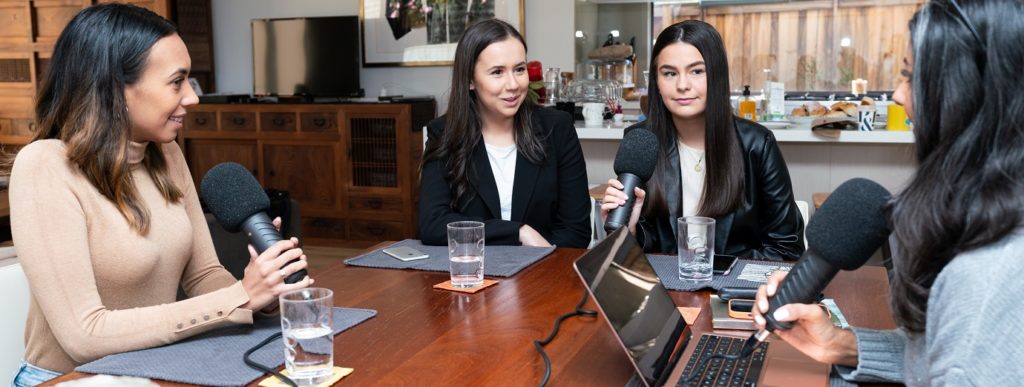What does leadership mean to young Indigenous women in Australia today?
In this week’s episode of The Leadership Lessons, Shirley Chowdhary speaks to Madison Howarth, Charlotte Ryan, and Bronte Charles, giving a special insight into each of these young women. We hear about their life experiences, resilience, and leadership aspirations.
Madi, Charlotte and Bronte met a number of years ago as scholars at the GO Foundation, an Indigenous education organisation founded by Adam Goodes and Michael O’Loughlin.
Now all at university, each have different interests and perspectives on life, but what’s clear from this conversation with Shirley is that they all draw a special strength from their culture and heritage. It’s what keeps them going in the face of adversity and pushes them forward each day.
Bronte speaks about her constant search for a sense of cultural belonging, which she also outlined in a powerful and award-winning essay published on Women’s Agenda.
“I remember I was once told by someone on my non-Indigenous side that I get the best of both worlds, because I get the perceived benefits of being Aboriginal, but I don’t look Aboriginal,” she shares.
“It’s such a unique, but shared experience getting your cultural identity questioned.”
Now studying a Bachelor of Marketing and Media at Macquarie University, Bronte holds close something her father told her when she was in high school – that she could be anything and anyone she wants to be.
“Uni has been such a confronting experience. No one from my family has ever gone to uni before. I’m loving it and I deserve to be there and that’s such a big thing for an Aboriginal person to say,” Bronte says. “My dad was right, I can be anything, I can do anything.”
Charlotte, who is studying a Bachelor of Clinical Sciences, and has hopes of moving into postgraduate medicine, says she may never have had the inspiration to go into medicine if it wasn’t for experience with the GO Foundation.
“It opened doors and opportunities that I never would have gotten if I hadn’t been a part of GO,” she says. “Getting the opportunity to see Indigenous excellence through GO definitely gave me some great role models.”
By entering medicine, Charlotte wants to use her skills and lived experience to help bridge the gap in Indigenous health outcomes.
“Something we’ve been learning at uni is that if you’re going to be treating your patients you have to empathise with them and there’s a big part of the Indigenous health sector that isn’t being made up by Indigenous doctors,” she says.
“There’s a lot of non-Indigenous doctors treating people without the same cultural awareness.”
Madi, who’s studying a Bachelor of Media in Communications and Journalism at UNSW and works part-time as a Community Content Coordinator at Future Women, shares that having visible role models is so critical for her.
For her, it was Brooke Boney’s presence on the Triple J breakfast show, and later on Nine’s Today show, that had the biggest impact.
“I used to listen to Triple J Breakfast when Brooke was on the show as the newsreader. She used to begin her morning news with “Yaama” and hearing someone say “Hello” or greeting in language, on a station like Triple J, it was kind of like…finally,” she explains.
“It was done in a way which was just normal. She would just say it so that people heard it every day. It started a conversation where people asked what it meant… and then it was just a normal part of that show.”

Madi, Charlotte and Bronte also share what reconciliation means to them, each mentioning the need for Australia to start having uncomfortable conversations.
“To be reconciled, Australia needs to realise the impacts of colonisation, the stolen generations, intergenerational trauma. Indigenous people aren’t equal right now,” Bronte says.
“It’s an uncomfortable truth and history that we have in this country,” Madi says. “I actually believe in this country and the people that are in it. We can definitely do more.”
For Charlotte, reconciliation is about recognising the need for equity, and levelling the playing field for Indigenous people.
“Reconciliation, to me where I’m currently at, means equal opportunity but not equality. It means equity,” Charlotte says. “It means a reconciled Australia moving forward together with a lot more knowledge and understanding of this history of Australia.”
Although these young women are just at the beginning of their leadership journey, they’re already uses their skills and voice to lift up others.
So, what keep them going?
“What keeps me going, and has become my leadership philosophy in a way, is thinking about the women especially in my life, who haven’t had the opportunities,” Madi shares. “My great grandmother who was part of the stolen generations, probably couldn’t have imagined the things that I have done.”
“She comes to mind whenever I have the privilege of speaking, when I’m in a room with people who I look up to.”
And as Bronte so eloquently puts, this strength goes back to her ancestors.
“You can’t deny it, I feel it when I’m in colonised environments, like uni, I feel that resilience, I feel that strength. I feel it when I’m tired and I don’t want to do it anymore. It’s resilience passed on from our ancestors. It’s undeniable, almost.”
The Leadership Lessons is made possible thanks to the support of Salesforce. You can listen below, or subscribe via iTunes or Spotify.


